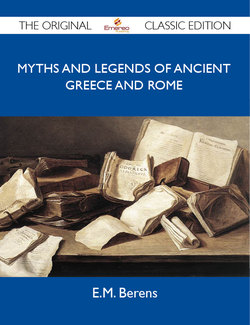Описание книги
This anthology is a thorough introduction to classic literature for those who have not yet experienced these literary masterworks. For those who have known and loved these works in the past, this is an invitation to reunite with old friends in a fresh new format. From Shakespeare s finesse to Oscar Wilde s wit, this unique collection brings together works as diverse and influential as The Pilgrim s Progress and Othello. As an anthology that invites readers to immerse themselves in the masterpieces of the literary giants, it is must-have addition to any library. <p> Mythology: our poems, our novels, and even our daily journals teem with classical allusions; nor can a visit to our art galleries and museums be fully enjoyed without something more than a mere superficial knowledge of a subject which has in all ages inspired painters, sculptors, and poets <p> This is a high quality book of the original classic edition. <p> This is a freshly published edition of this culturally important work, which is now, at last, again available to you. <p> Enjoy this classic work. These few paragraphs distill the contents and give you a quick look inside: <p>
The study of the classics themselves, even where the attainments of the pupil have rendered this feasible, has not been found altogether successful in giving to the student a clear and succinct idea of the religious beliefs of the ancients, and it has been suggested that a work which would so deal with the subject as to render it at once interesting and instructive would be hailed as a valuable introduction to the study of classic authors, and would be found to assist materially the labours of both master and pupil.
<p>…When the Greeks first settled in Italy they found in the country they colonized a mythology belonging to the Celtic inhabitants, which, according to the Greek custom of paying reverence to all gods, known or unknown, they readily adopted, selecting and appropriating those divinities which had the greatest affinity to their own, and thus they formed a religious belief which naturally bore the impress of its ancient Greek source. As the primitive Celts, however, were a less civilized people than the Greeks, their mythology was of a more barbarous character, and this circumstance, combined with the fact that the Romans were not gifted with the vivid imagination of their Greek neighbours, leaves its mark on the Roman mythology, which is far less fertile in fanciful conceits, and deficient in all those fairy-like stories and wonderfully poetic ideas which so strongly characterize that of the Greeks.
<p>…By making Oceanus therefore the offspring of Uranus and Gæa, the ancients, if we take this notion in its literal sense, merely assert that the ocean is produced by the combined influence of heaven and earth, whilst at the same time their fervid and poetical imagination led them to see in this, as in all manifestations of the powers of nature, an actual, tangible divinity.
<p>…The Giants, those hideous monsters (some with legs formed of serpents) who had sprung from the earth and the blood of Uranus, declared war against the triumphant deities of Olympus, and a struggle ensued, which, in consequence of Gæa having made these children of hers invincible as long as they kept their feet on the ground, was wearisome and protracted.
The study of the classics themselves, even where the attainments of the pupil have rendered this feasible, has not been found altogether successful in giving to the student a clear and succinct idea of the religious beliefs of the ancients, and it has been suggested that a work which would so deal with the subject as to render it at once interesting and instructive would be hailed as a valuable introduction to the study of classic authors, and would be found to assist materially the labours of both master and pupil.
<p>…When the Greeks first settled in Italy they found in the country they colonized a mythology belonging to the Celtic inhabitants, which, according to the Greek custom of paying reverence to all gods, known or unknown, they readily adopted, selecting and appropriating those divinities which had the greatest affinity to their own, and thus they formed a religious belief which naturally bore the impress of its ancient Greek source. As the primitive Celts, however, were a less civilized people than the Greeks, their mythology was of a more barbarous character, and this circumstance, combined with the fact that the Romans were not gifted with the vivid imagination of their Greek neighbours, leaves its mark on the Roman mythology, which is far less fertile in fanciful conceits, and deficient in all those fairy-like stories and wonderfully poetic ideas which so strongly characterize that of the Greeks.
<p>…By making Oceanus therefore the offspring of Uranus and Gæa, the ancients, if we take this notion in its literal sense, merely assert that the ocean is produced by the combined influence of heaven and earth, whilst at the same time their fervid and poetical imagination led them to see in this, as in all manifestations of the powers of nature, an actual, tangible divinity.
<p>…The Giants, those hideous monsters (some with legs formed of serpents) who had sprung from the earth and the blood of Uranus, declared war against the triumphant deities of Olympus, and a struggle ensued, which, in consequence of Gæa having made these children of hers invincible as long as they kept their feet on the ground, was wearisome and protracted.
